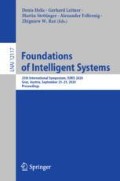Abstract
The uncontrolled growth of fake news creation and dissemination we observed in recent years causes continuous threats to democracy, justice, and public trust. This problem has significantly driven the effort of both academia and industries for developing more accurate fake news detection strategies. Early detection of fake news is crucial, however the availability of information about news propagation is limited. Moreover, it has been shown that people tend to believe more fake news due to their features [11]. In this paper, we present our framework for fake news detection and we discuss in detail a solution based on deep learning methodologies we implemented by leveraging Google Bert features. Our experiments conducted on two well-known and widely used real-world datasets suggest that our method can outperform the state-of-the-art approaches and allows fake news accurate detection, even in the case of limited content information.
Access this chapter
Tax calculation will be finalised at checkout
Purchases are for personal use only
References
Agrawal, D., et al.: Challenges and opportunities with big data. A community white paper developed by leading researchers across the United States. Technical report, Purdue University, March 2012
Allcott, H., Gentzkow, M.: Social media and fake news in the 2016 election. Working Paper 23089, National Bureau of Economic Research, January 2017
Cassavia, N., Masciari, E., Pulice, C., Saccà, D.: Discovering user behavioral features to enhance information search on big data. TiiS 7(2), 7:1–7:33 (2017)
Culpepper, J.S., Moffat, A., Bennett, P.N., Lerman, K. (eds.) Proceedings of the Twelfth ACM International Conference on Web Search and Data Mining, WSDM 2019, Melbourne, VIC, Australia, 11–15 February , 2019. ACM (2019)
Flach, P.A., Kull, M.: Precision-recall-gain curves: PR analysis done right. In: Cortes, C., Lawrence, N.D., Lee, D.D., Sugiyama, M., Garnett, R. (eds.) Advances in Neural Information Processing Systems 28: Annual Conference on Neural Information Processing Systems 2015, Montreal, Quebec, Canada, 7–12 December 2015, pp. 838–846 (2015)
Guo, C., Cao, J., Zhang, X., Shu, K., Yu., M.: Exploiting emotions for fake news detection on social media. CoRR, abs/1903.01728 (2019)
Masciari, E.: SMART: stream monitoring enterprise activities by RFID tags. Inf. Sci. 195, 25–44 (2012)
Potthast, M., Kiesel, J., Reinartz, K., Bevendorff, J., Stein, B.: A stylometric inquiry into hyperpartisan and fake news. CoRR, abs/1702.05638 (2017)
Shu, K., Sliva, A., Wang, S., Tang, J., Liu, H.: Fake news detection on social media: a data mining perspective. CoRR, abs/1708.01967 (2017)
Shu, K., Wang, S., Liu, H.: Beyond news contents: the role of social context for fake news detection. In: Culpepper et al. [4], pp. 312–320
Vosoughi, S., Roy, D., Aral, S.: The spread of true and false news online. Science 359(6380), 1146–1151 (2018)
Zhou, X., Zafarani, R., Shu, K., Liu, H:. Fake news: fundamental theories, detection strategies and challenges. In: Culpepper et al. [4], pp. 836–837
Acknowledgement
Elio Masciari has been supported by POR Calabria project SPIDASEC.
Author information
Authors and Affiliations
Corresponding author
Editor information
Editors and Affiliations
Rights and permissions
Copyright information
© 2020 Springer Nature Switzerland AG
About this paper
Cite this paper
Masciari, E., Moscato, V., Picariello, A., Sperli, G. (2020). A Deep Learning Approach to Fake News Detection. In: Helic, D., Leitner, G., Stettinger, M., Felfernig, A., Raś, Z.W. (eds) Foundations of Intelligent Systems. ISMIS 2020. Lecture Notes in Computer Science(), vol 12117. Springer, Cham. https://doi.org/10.1007/978-3-030-59491-6_11
Download citation
DOI: https://doi.org/10.1007/978-3-030-59491-6_11
Published:
Publisher Name: Springer, Cham
Print ISBN: 978-3-030-59490-9
Online ISBN: 978-3-030-59491-6
eBook Packages: Computer ScienceComputer Science (R0)

